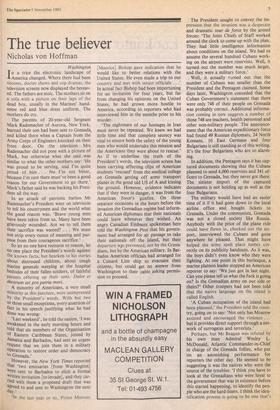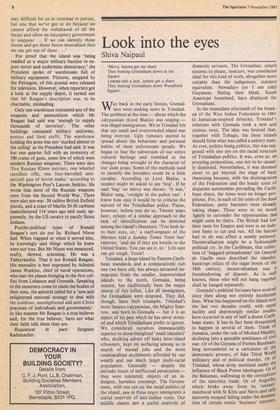The true believer
Nicholas von Hoffman
In a trice the electronic landscape of America changed. Where there had been sitcoms, doctor shows and cop dramas, the television screens now displayed the bereav- ed. The fathers are stoic. The mothers sit on a sofa with a picture on their laps of the dead boy, usually in the Marines' hand- some red and blue dress uniform. The mothers do cry.
The parents of 20-year-old Sergeant Mark Rademacher of Aurora, New York, learned their son had been sent to Grenada, and killed there when a Captain from the Army Corps of Engineers knocked on their front door. On the television Mrs Rademacher did not pose with a picture of Mark, but otherwise what she said. was similar to what the other mothers say: 'He was proud to be serving, and I'm quite proud of him . . . No I'm not bitter, because I'm sure there must've been a good reason for our Government to go there.' Mark's father said he was backing his Presi- dent all the way.
In an attack of patriotic bathos Mr Rademacher's President went on television to tell his countrymen and the world what the good reason was. 'Brave young men have been taken from us. Many have been grievously wounded. Are we to tell them their sacrifice was wasted? . . We must not strip every ounce of meaning and pur- Pose from their courageous sacrifice.'
So let no one have recourse to reason, let no one place the President's words against the known facts, but hearken to his stories about distressed children, about tough marine generals weeping at the hospital bedsides of their fallen soldiers, of faithful Parents offering up their sons. Duke et decorum est pro patria mori.
A minority of Americans, a very small minority at this juncture, were unimpressed by the President's words. With but two or three small exceptions, every assertion of fact in his speech justifying what he had done was wrong: 'Last weekend', he told the nation, 'I was awakened in the early morning hours and told that six members of the Organisation of Eastern Caribbean States, joined by Jamaica and Barbados, had sent an urgent request that we join them in a military operation to restore order and democracy to Grenada.'
However, the New York Times reported that `two emissaries [from Washington] Were sent to Barbados to elicit a formal Written invitation [to invade], and they car- ried with them a proposed draft that was
agreed to and sent to Washington the next day,.
'In the last year or so, Prime Minister [Maurice] Bishop gave indication that he would like to better relations with the United States. He even made a trip to our country and met with senior officials ... ' In actual fact Bishop had been importuning for 'an invitation for four years, but far from changing his opinions on the United States, he had grown more hostile to America, according to reporters who had interviewed him in the months prior to his murder.
'The nightmare of our hostages in Iran must never be repeated. We knew we had little time and that complete secrecy was vital to ensure both the safety of the young men who would undertake this mission and the Americans they were about to rescue.' As if to underline the truth of the President's words, the television screen has been carrying affecting clips of American students 'rescued' from the medical college on Grenada getting off army transport planes in the good old US of A and kissing the ground. However, evidence indicates that if they were in danger, it was from the American force's gunfire. On three separate occasions in the hours before the invasion the Grenadian regime had inform- ed American diplomats that their nationals could leave whenever they wished. An angry Canadian Embassy spokesman here told the Washington Post that his govern- ment had arranged for air passage to take their nationals off the island, but their departure was prevented, not by the Grena- dians, but by the American military. In Bar- bados American officials had arranged for a Cunard Line ship to evacuate their citizens, but could get no answer from Washington to their cable asking permis- sion to proceed.
The President sought to convey the im- pression that the invasion was a desperate
and dramatic tour de force by the armed
forces: 'The Joint Chiefs of Staff worked around the clock to come up with the plan.
They had little intelligence information about conditions on the island. We had to assume the several hundred Cubans work- ing on the airport were reservists. Well, it turned out the number was much larger, and they were a military force.'
Well, it actually turned out that the number of Cubans was smaller than the President and the Pentagon claimed. Some days later, Washington conceded that the Cuban Government's statement that there were only 748 of their people on Grenada was probably correct. Additional informa- tion coming in now suggests a number of those 748 are teachers, health personnel and other non-military people. The announce- ment that the American expeditionary force had found 49 Russian diplomats, 24 North Koreans, 10 East Germans and four Bulgarians is still standing as of this writing. It's the four Bulgarians who are so alarm- ing.
In addition, the Pentagon says it has cap- tured documents showing that the Cubans planned to send 4,000 reservists and 341 of- ficers to Grenada, but they never got there. The sinister import of the captured documents is not holding up as well as the four Bulgarians.
The military would have had an easier time of it if it had gone down to the local airline office and bought tickets to Grenada. Under the communists, Grenada was not a closed society like Russia.
Anybody with the price of the plane ride could have flown in, checked out the air- port, interviewed the Cubans and gone anywhere he pleased. That might have helped the army spell place names cor- rectly on its publicity handouts. As it was, the boys didn't even know who they were fighting. At one point in this burlesque, a marine platoon leader stopped an American reporter to say: 'We just got in last night.
Can you please tell us what the fuck is going on? Is the Grenadian army on our side or theirs?' Other troopers had not been told that the native language on the island is called English.
'A Cuban occupation of the island had been planned,' the President told the coun- try, going on to say: 'Not only has Moscow assisted and encouraged the violence ... but it provides direct support through a net- work of surrogates and terrorists.'
Perhaps, but Mr Reagan was refuted by his own man Admiral Wesley L.
McDonald, Atlantic Commander-in-Chief in charge of the Grenada follies, who put on an astonishing performance for reporters the other day. He seemed to be suggesting it was the natives who were the source of the troubles: 'I think you have to look at the Grenadians who were loyal to the government that was in existence before this started happening, to identify the peo- ple who are the hard-liners. I think the iden- tification process is going to he one that's very difficult for us to continue to pursue, but one that we've got to do because we cannot afford the withdrawal of all the forces and allow an insurgency government to reappear ... If we can identify those forces and get those forces neutralised then we can get out of there ...'
For proof that the island was 'being readied as a major military bastion to ex- port terror and undermine democracy,' the President spoke of warehouses full of military equipment. Pictures, snapped by the Pentagon, of this arsenal were released for television. However, when reporters got a look at the supply depot, it turned out that Mr Reagan's description was, to be charitable, misleading.
Only one warehouse contained any of the weapons and ammunition which Mr Reagan had said was 'enough to supply thousands of terrorists'. The other buildings contained military uniforms, motors and food stuffs. The warehouse holding the arms was not 'stacked almost to the ceiling' as the President had said. It was but one quarter full with an inventory of 190 crates of guns, some few of which were modern Russian weapons. There were also 'five Russian 82mm mortars, one wheeled recoilless rifle, one four-barrelled anti- aircraft gun of Soviet make,' according to
the Washington Post's Lauren Jenkins. He
wrote that most of the Russian weapons were from the Second World War. There were also pre-war .38 calibre British Enfield pistols, and a crate of Marlin 30-30 carbines manufactured 114 years ago and used, ap- parently, by the US cavalry to pacify Sioux Indians.
Psycho-political types of Ronald Reagan's sort do not lie. Richard Nixon lied. When trapped or when it served him, he knowingly said things which he knew were not true. But Mr Nixon was measured, crafty, shrewd, scheming. He was a Talleyrandist. That is not Ronald Reagan. His mentality is best expressed by Admiral James Watkins, chief of naval operations, who met the planes bringing in the first cof- fins from Lebanon and Grenada. Speaking to the mourners come to claim the bodies of their sons, the admiral called for a 'new and enlightened national strategy to deal with the insidious, unenlightened and anti-Christ practices of individuals and governments'. In like manner Mr Reagan is a true believer and, for the true believer, facts are what their faith tells them they are.
Requiescat in pace Sergeant Rademacher.















































 Previous page
Previous page